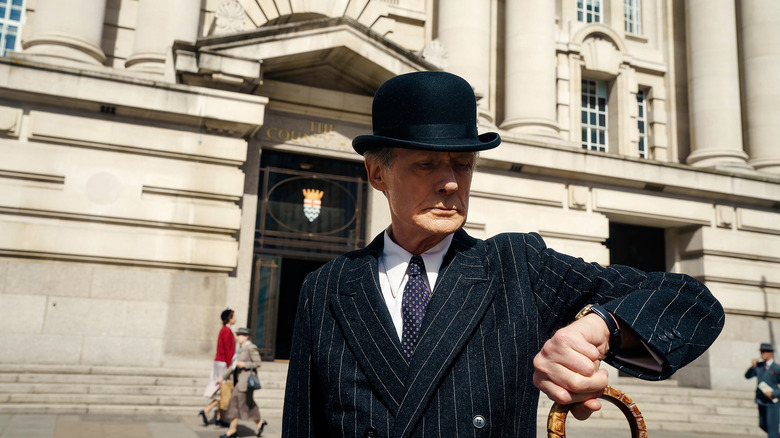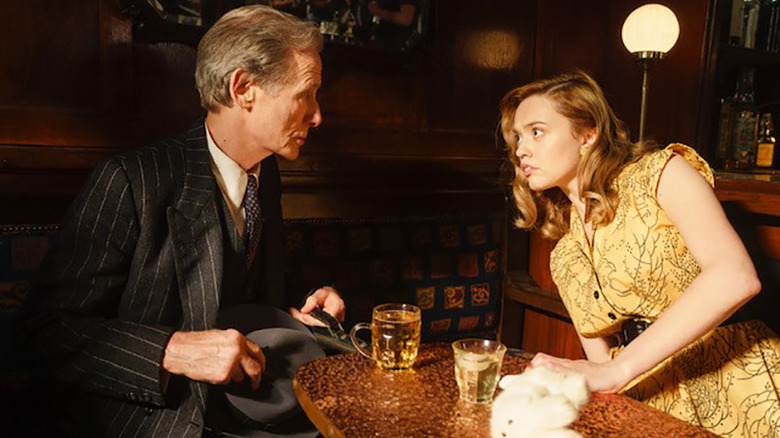Living Review: Bill Nighy Leads A Quietly Affecting Remake Of Akira Kurosawa's Ikiru [Sundance 2022]
Remaking the work of Akira Kurosawa ("Seven Samurai," "Rashomon") is almost sacrilegious. How can any filmmaker possibly hope to measure up to the masterful storytelling of such a cinematic legend? Well, in the case of Kurosawa's classic masterpiece "Ikiru," it's almost imperative that the film be remade. For a story that hones in on the fleeting nature of human life and how everything we do is destined to be forgotten, we must be reminded to live as much as we can in the short time that we have on this orbiting rock.
Director Oliver Hermanus has no problem bringing the important lesson of "Ikiru" to the forefront of our mind in his somewhat more contemporary adaptation, "Living." It stars Bill Nighy as the staunch, reserved bureaucrat Mr. Williams, who has become so entrenched in his daily routine that he's come to be fearfully respected by his co-workers as he quietly goes about his business in the dreary offices of the London County Hall shortly after the end of World War II. Perpetually morose after the passing of his wife some time ago, Williams has chosen to disappear into the piles of paper on his desk, opting to brush aside any real difference he might make, such as helping a group of passionate women who want to turn a crumbed building destroyed during World War II into a new playground for the neighborhood children.
The Mundane Bureaucracy
Despite being remade 70 years after "Ikiru," Hermanus' "Living" still has a classic feel from the beginning, complete with a vintage-style opening credits sequence with elegant text and archival footage of London taking us back many decades. Our story begins with the fresh-faced Mr. Wakeling (Alex Sharp) beginning his first day of work at London County Hall, joining the ranks of the rest of crisp suits and bowler hats hopping a train into town for their day of work. The formality and politeness between these citizens is almost painful, with pauses between greetings and exchanges so big you could park a truck between them. It just gets worse when these white-collar workers are in the presence of Mr. Williams. Only the most necessary of conversations are had as the London County Hall employees go about their day in the most proper manner possible.
But for all the fear and silence that Mr. Williams inspires, he's not a curmudgeonly fellow. There's a sadness about the man who opts to speak in an almost haunting whisper, and Bill Nighy is able to exude an air of kindness despite his stoic nature in a quiet but resonant performance. That's why you can't help but feel for Williams when he's diagnosed with a terminal illness that will give him only six months to live. This only leads to despair when Williams struggles to figure out what to do with his remaining time, which includes not telling his adult son and daughter-in-law with whom he resides.
After meeting a debaucherous young man (Tom Burke) who decides the best course of action is to get him drunk and take him to what amounts to a strip club in a circus tent near an amusement park pier, Williams only seems to be more lost as he wanders London during the day, skipping out on work as his underlings wonder what may have happened to him. It's not until he spends a fancy lunch with former co-worker Margaret (Aimee Lou Wood) that he feels at least a bit of a spark. But this isn't the kind of story where an old man finds life in love for the heart of a young woman. Instead, it allows him to find at least some semblance of significance in the very work that he previously lost himself in.
Classic and Contemporary
Oliver Hermanus expertly portrays the bureaucracy of post-WWII London in the stiffest fashion, for better and for worse. Despite the period setting, the movie also somehow feels timeless, as if it were made in the 1950s, but with a visual style that calls to mind the cinematography of Janusz Kaminski's work with Steven Spielberg on "Bridge of Spies." Kazuo Ishiguro's script doesn't lean into sentimentality, and while that doesn't prevent him from telling a truly human story that is simultaneously uplifting and tragic all at once, it does make the film feel a little long, even with a 102-minute runtime. It's British through-and-through, with plenty of wistfulness to go around. But Nighy brings a dignity to the proceedings that you can't help but admire, especially when it comes to Williams' sudden self-awareness in his final days, and that helps keep your attention.
For those who have seen "Ikiru," you won't be surprised by how the film's third act plays out. For everyone else, you'll discover that the story of Mr. Williams doesn't exactly end with his death. Even if Williams is bound to be forgotten, it doesn't mean he didn't live. But what does it mean to live? It doesn't have to be grand or noteworthy, and it almost never is. But it's something we all must determine for ourselves before it's too late. Hermanus' take on "Ikiru" doesn't accomplish anything groundbreaking, though, at the very least, it reminds us that we are alive, and we should be inclined to remember that from time to time.
/Film Rating: 7 out of 10


